Composite bonding
What is composite bonding?
Composite bonding (also known as tooth bonding or dental bonding) offers a solution for minor damage or gaps in teeth. When carried out as a cosmetic treatment, it is not available on the NHS but many of our Bupa Dental Care practices offer cosmetic composite bonding as a private service.
Dental bonding is usually used for filling chips, fractures or gaps between teeth, or for fixing discolouration.
A composite resin is attached to a tooth and shaped to restore its original appearance. The colour of the resin is matched to your teeth, so it will appear as though it is a natural part of the tooth.
Interested in composite bonding? With over 250 dental practices providing this treatment nationwide, we are here to answer your questions and help you arrange the next steps.
Real stories: Composite bonding
Dave was worried about his teeth, so much so that he was afraid to smile. Hear about his experience of composite bonding, and how it boosted his confidence.
Transcript
What would you say to someone thinking about getting composite bonding?
Do it, because it's a real difference to me.
I'm quoting a famous sporting organisation here, but just do it.
Were you fearful going into your treatment?
I think you've always got a little bit in your mind
of going in for a treatment.
It's not a check-up.
It's not anything normal
that you've had before with a dentist.
This was treatment, so there was some anxiety,
but as it turned out, I didn't have any worries at all.
Were you able to eat or drink afterwards?
Yeah, yeah, I think I was just told them not
to bite into an apple, but yeah, virtually straight away.
Went home, had lunch.
Wasn't a steak, but I think it was sort of softer foods
for the first dinner.
But after that, no problem.
How many times did you need to visit the practice during your treatment?
I think we had a discussion during one of my
standard check-ups, and we talked about the sort of things
that needed to be done.
Then I went in for a little bit of assessment
and exploratory work,
and then you needed a longer actual appointment
to be able to do the work.
So it was three times altogether.
How was the dentist talked about when you were younger?
It is interesting that, because I think it was other
people who probably cause you the anxiety.
It was often a question would be asked would be,
are you going to the dentist tomorrow?
Yeah. Are you having work done?
Oh, it's not just a check-up then. Oh, I hope it's all right.
And I think that was the sort of thing that really started
to fuel some of the anxiety,
and that was probably more worrying than actually being in
the chair, is what people were intimating
to you and what you might go through.
What is your memory of the dentist as a child?
Not too bad actually, although my real fear was caused
by having to have a general anaesthetic, I had
to have four teeth out to make some room for growing teeth.
And the general anaesthetic was the first
time I'd experienced that.
And where I came around, I was really spooked
and I rushed across to my mum who was in the surgery
and I was very wobbly.
And ever since then I was really,
really uptight about having general anaesthetic.
I don't think you have it now.
So it's all gone away for young people.
How did the dentist put you at ease?
Well, I know my dentist, I've known her for a long time.
I know a little bit about your family background, so
she knows about my family background.
She's treated my two sons,
so there's immediately a rapport between us.
We can talk generally about how they're doing,
what your lad's up to, how's things with you.
So it is a very, very easy
conversation, atmosphere.
So yeah, it was fine.
What were your fears going into the treatment?
I think the fears will be, would it work
and would I look different?
I did talk to one or two people about,
do you think I should have something done?
And the general reply was, yeah,
but you are you. You are Dave.
Why do you want to have something different?
But it didn't take away that self-consciousness.
But I'm really glad that I did
and hopefully the results are okay.
How important was it to you to smile with your grandchildren?
That's why I had it done.
I wanted them to see granddad -
well, they don't call me granddad.
I won't tell you what name they call me.
A few of them, I'll tell you that,
but I just wanted them to see me as someone
who could laugh and joke with them
and be able to be confident with them
and in some ways, to know
that they've got a granddad who's got squiffy teeth,
they've got some of their granddad who has teeth
not quite like theirs, but nearly like theirs.
Was your treatment painful?
No it wasn't.
I think I'd remember if it was. It was interesting in that
it was more just adding to one
of the thicknesses of the teeth.
I think it's this one, this one so,
it effectively brought it forward,
and it was almost like a little bit of putting
some sort of mixture inside your teeth
and smoothing it all down.
No, it was fine.
How did your friends and family react?
I'll tell you what happened.
The first time that I'd had them done, it's back
to the airport again,
and we were at Faro Airport
and we're with my family
and meeting my eldest son and his family,
and they were waiting for us, and we walked up to them
and I didn't smile.
And then suddenly I smiled at both my two grandchildren
and they said, whoa, look at that.
And that was a brilliant reaction,
and I felt really so pleased that I'd had it done.
How do you feel about visiting the dentist now?
Fine.
Just you go in, you get the next date.
You look on your phone, right? Yeah, I can do it then.
Yeah, that'll be fine.
You forget about it, dentists now,
or certainly this dentist, always sends you a reminder
on your phone, you didn't get that when I was younger.
You'd certainly no phones and no texts
or anything, get a text saying,
just a reminder about your dental appointments at such
and such a date, at such and such a time.
If you have any problems, please get in
touch, and it's there.
And then day of the dentist, get in the car. Off you go.
Fine.
What was your experience like during the treatment?
Actually it was entertaining.
There was a television screen, which was over my head
as you went back in the chair
and you could watch the television, whatever was on,
there's no sound, but they just had the subtitles on.
So there I was watching the television.
I think as well that the dental surgeon are
much more welcoming.
They want you to relax.
They want the patient to be relaxed when they're working
and you're sitting in the chair.
So there may be other things, they may put the radio on,
there may be music,
or in my case, I watch the telly.
What was your experience like after the treatment?
It was absolutely great.
Every time that I've had treatment, there's not been
any aftermath problems at all.
There's no pain anymore from local anaesthetics.
The fear of the needle and that sharp pain when it goes in,
it was absolutely fine.
Even now when you get older, I've sometimes, I've had
to have teeth out and no problems at all.
Yeah, you're given the instructions
and if you've got pain, there's Ibuprofen, take this, take that.
I've never had any pain whatsoever with any
of the treatment that I've had.
It's just getting the numbness wearing off from any local
anaesthetic so you're able to get your mouth around a glass
of beer again.
How was the impact on your life before and after the treatment?
Afterwards, much more confident, able to come
and talk to you like this.
Before I would become outfit.
I've always been quite extrovert -
I've always had a lot of people to meet.
I think I was becoming more
and more introverted, more
and more stern face.
It's often, oh, you've got your cross face on.
It was just a natural face,
and I think it's a natural face now.
Resting face, that's the phrase.
I think my resting face is more smiley
rather than... it's...,
how's that?
What myths of the dentist do you believe you carried with you as a child?
I think it was probably having a filling. When you went
for your check-up and the dentist went through all your teeth
and then said, yep, that's okay.
No problem. And you then just went
for your next appointment.
If he then said to his assistant something like upper fourth
or rear third, you knew there was a filling going
to be coming and that you would have
to go make another appointment,
and then that would be the day of the filling, and you came
and sat in the chair and the drill came out and the noise,
and you were hoping
and hoping that it wouldn't quite touch your nerve.
You did have a local anaesthetic,
but it always seemed to get that excruciating little pain,
but it was the noise, the drill.
I can still hear the drill.
Were you ever concerned about your age as an impact on your composite bonding?
When you're young, you always want to be older.
When you're older, you want to feel that you are younger,
and when you're really old like me, you just want to try
and ensure that you look younger.
And do you know what? I think it really helped me.
I think it's helped me feel younger,
even though you might not think I look younger,
and I wanted to have fun with grandchildren to be able
to be in pictures, to laugh and joke with them,
and it never crossed my mind.
So yeah, I thought, yeah,
do you really need to have this done?
Yeah, I do because I wasn't confident and I'm confident now
and I can have a laugh and I can have a smile.
What impact has having composite bonding had on your life?
Well, I'll tell you what it hasn't affected, when you go
into, say, a European airport going on holiday
and you walk up to the passport control, one of the things
that has been suggested is
that you look the person who's stamping your passport in the
eye and smile at him or her.
So I did. I felt really confident that I could do that.
I don't know whether it made a difference,
but I would never have stopped.
And I think it was just that confidence able to think
that when you meet people, it's the first five seconds.
Everybody says it's the first five seconds
when you meet somebody.
And if you can walk up to somebody and look them in the eye
and smile,
I think people immediately put up their ears.
I never, ever really did that until much later,
and certainly when I was concerned about those
squiffy teeth, I don't think they look too bad, do they? Okay?
How did you feel when you first smiled at yourself in the mirror?
Different. If you were to look up my passport photograph,
that is an absolute shocker.
I am so stern-faced, didn't dare smile.
I mean, I know you're not supposed to smile on a passport,
but I can see myself in that passport photograph,
completely conscious of a thin line,
no mad movement, bit like that.
And now if there's a photograph, I think one
of the differences is meeting people, walking through doors
and meeting people for the first time and looking at them
and smiling, and I can do that.
I had some instances before where you had to go
and sit in conferences
and sit around the table, introduce yourself.
I know that I didn't readily smile
because I was a little bit knowing
of the crooked teeth.
Now, no problem at all.
What was your experience like when you first spoke to the team?
Well, it was a dental team, actually the dentist
that I knew best.
I'd had the same dentist,
and she was a local dentist for a good number of years.
But then she moved surgeries
and I still went to the local dental surgery,
but it was a different dentist.
But I wanted to stay with the dentist that I knew best.
So I transferred surgeries
and I was much more confident.
And then I was reassured
because the dentist that I was talking to
and her assistant knew me well, at least a dentist knew me,
over a good number of years.
She'd seen what had happened in my mouth
because she'd been the dental person in charge
and she knew that I'd had this movement
and this crossover that I was very conscious of it.
So she explained everything in detail, what could be done
and what it would look like.
And that was the thing.
I wanted to stay with the person that knew me best.
Why did you wish to get composite bonding?
I was becoming more
and more aware of the crossing over of my two front teeth.
I think it's a family trait.
My dad had a little bit of crossover with the teeth
and then I did have some work done and it eased the gap.
And I wasn't really as conscious all the way through a lot
of my working life, but I think it was probably with Covid
and having to go on to Zoom video conferencing.
And you see yourself immediately in a screen
and I'm thinking, gosh,
I'm sure those teeth are getting a bit more crossed.
And I became very, very concerned when I was meeting people
and I wouldn't smile.
And I didn't want to smile on photographs with, especially
with my grandchildren, and they never made any remarks about
it, but I could just sometimes see about, I didn't want them
to think, oh, that's grandad with squiffy teeth.
So I was very, very aware of it.
How was your experience once you arrived at the practice?
It is a two way street, this.
You need to feel as though
you are going into an area where they're going to treat you.
And that's not just sitting in the chair.
It's immediately go through the door into the reception.
And there are receptionists, was in my cases 2.
There's always a smile and immediately you're attended to,
and yeah, just take a seat over there
and you then wait to be called to go again,
in my case upstairs, to see my dentist.
And I think the important thing is to trust
that you're in the right place
and that you are with the right person.
And they also will be able to see from your reaction
how you're feeling because they're trained to spot that.
And I've never had a problem at all in all the time
that I've been with my current dentist,
and certainly since where she's moved to the new practice.
I felt even better when just walking through the door.
What was your treatment?
The treatment actually was, I think it's called bonding.
It's where the dentist is applying like a paste
or a bond to this tooth in particular, which was
behind this tooth and where it was crossing.
And it brings it up to the surface
to bring it up to the level of the other one.
So I've got this nice smile.
I know that there are braces we discussed
about having braces, but when we really talked,
and of course my dentist have been involved
with my dental healthcare for quite some time,
my teeth at my age were not as strong.
To be able to have the strain to hold detachments,
to keep the braces in place
and for the teeth then to slowly come
together and form the smile as I wanted,
it would've taken too long
and the attachments wouldn't have been able to be in place.
So we did the bonding
and I think they're all right, aren't they?
I think so.
How old were you when you had your treatment?
Oh, good question.
Well, it was certainly, I think around
after Covid, so
I think I would be about 69
and yeah, I remember pictures of me on my 70th birthday,
my teeth are okay - like this.
Why did you have it done?
There's no doubt about it that I wasn't conscious of it
until quite late in life.
But then as you get older
and my dentist says, your teeth do move.
And it was definitely,
I think when you're having meetings online, which came about
during the pandemic,
that you're looking at yourself on screen
and I thought, oh yeah, they're quite crooked,
they're quite crossed.
And that's when I started to stop smiling at cameras
for photographs and talking to people almost such,
okay, no problem.
And then you look quite stern, don't you?
So I decided to have it done.
How long did the composite bonding take?
Do you know, I never really noticed.
It takes longer if you're having the sort
of treatment that I had.
But you remember that I had to telly to watch.
I think I watched a couple of segments
on whatever programme it was.
I think probably maybe half an hour,
altogether a bit longer.
It is difficult to say,
but it really wasn't
uncomfortable at all.
Sitting in that chair you were feeling,
and the dentist was saying, I'm just going
to do this little bit.
You might feel a little bit of irritation there.
If you've got something immediately let me know. We'll stop.
I never did. I've never actually ever stopped her.
When she said, this might
cause you a little bit of an irritation.
This might be a little bit of pain.
There's never been anything at all,
and I have never thought, oh gosh,
this is taking a long time.
I mean, I did have some root canal done quite recently,
and that's another term, which is, oh, root canal.
You hear it on films and it was fine.
Absolutely fine.
So I have no problem at all with the lengthy time
because I didn't even notice it.
Did you need any additional treatment?
As you get older, you naturally need more treatments.
One of the things that did change, used to have
a checkup every six months.
Now I have a checkup every three months,
and I found as I've got older,
then the dentist is telling me more about
receding gums and therefore your teeth are loosening.
So I've actually had to have teeth out
and I think in some ways that was causing a lot
of the movement in my mouth with the teeth,
hence going through the straightening.
And then you are looking at sometimes
some infections occur
and I had to have root canal, those words, root canal.
You see it on films and people saying,
oh my goodness me, root canal.
Do you know? It wasn't that bad. Yeah, it is quite long.
It's involved. You get things that go over your mouth,
but I honestly didn't feel any
pain whatsoever.
And the other thing that I now have is
because I have lost some teeth,
I've had a dental plate fitted, so I've got some
false teeth, plastic teeth.
I've got them in now, so I can smile at you better if I
had not had them in.
There might be one or two gaps you'd have seen,
but I think it looks all right.
Yeah, yeah, and I'm fine.
I think one of the things as well that I remember is
the two words, root canal, was probably the most fearful
thing that I've had some concern about, some,
I won't call it fear, but anxiety about having it done.
But it was absolutely no problem at all.
What would you say to your younger self about your dental anxiety?
Go to the dentist.
Don't be frightened of going to the dentist.
Make sure you clean your teeth.
And it's easy to say that,
but you know, it's easy until
sometimes "Ah, I won't clean my teeth".
"Too busy". "Oh, I've got to rush out".
That makes a difference,
because if I'd have known now, what I knew then
that I was going to have some problems with some gum disease
and recession.
We didn't know about flossing
or interdental brushes
or even the way to clean your teeth. When I was younger,
you clean your teeth like this up there, up there, that out.
You went, now you've got to do it properly.
And I do it properly all the time with a brush upright.
And I never knew anything about cleaning
the inside of your teeth.
And that was something that was taught to me by a dentist.
So those are the things -
when you get in a car now you put
your seatbelt on, don't you?
Everybody does it. You don't even consider it.
It's not even a thought.
But when I was younger, cars didn't have a seatbelt,
and you had to be completely always reminded
to put your seatbelt on.
Now you just do it. Same thing is about cleaning your teeth.
It's like putting your seatbelt on.
You never forget, you just do it.
So morning, night, toothbrush, upright,
proper cleaning for two minutes.
My brush actually tells me when
I've been cleaning for two minutes.
And then you put all in the gaps and that's it.
And do that twice a day
and you won't have the problems
that I've found I've been having now.
Composite bonding: Before and after
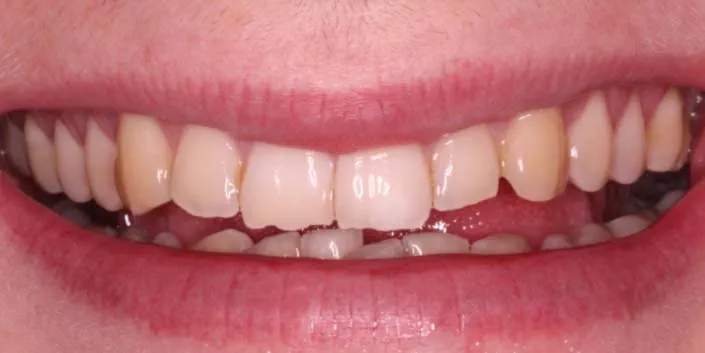
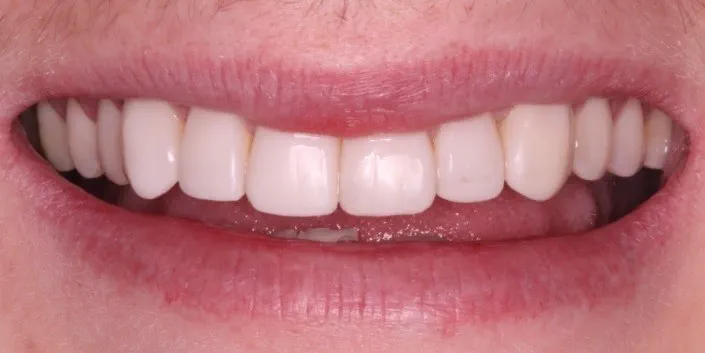
Dentist, Karim Abdel-Khalek at our Clifton practice in Bristol, used a combination of teeth whitening and composite bonding to improve the shape and length of this patient’s teeth to achieve a desired result.
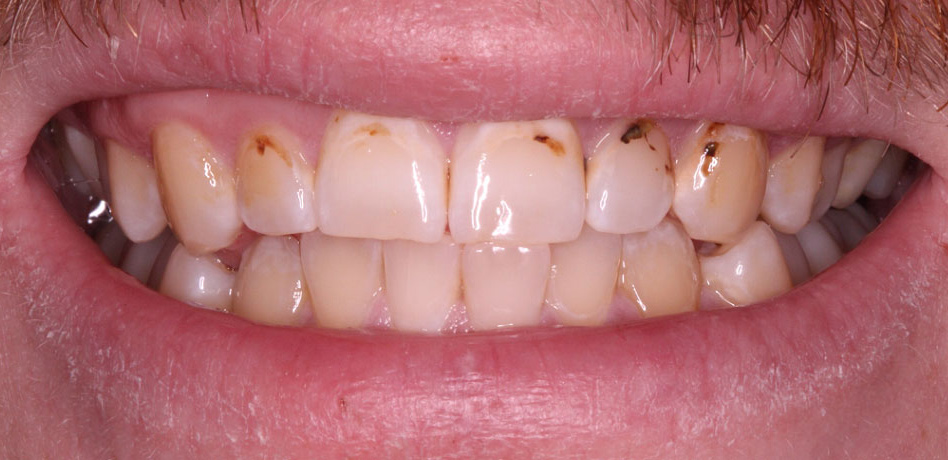
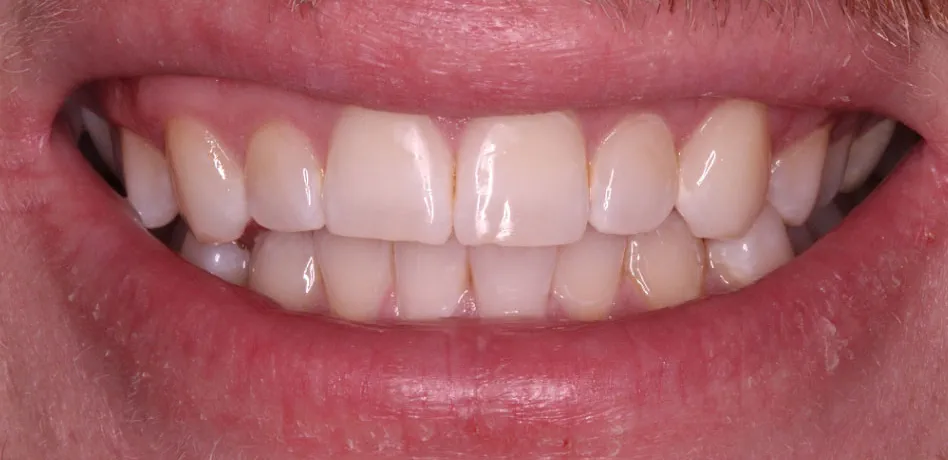
Minimally invasive composite bonding (involving very little removal of tooth structure) was used to mask brown spots and improve the appearance of this patient’s smile.
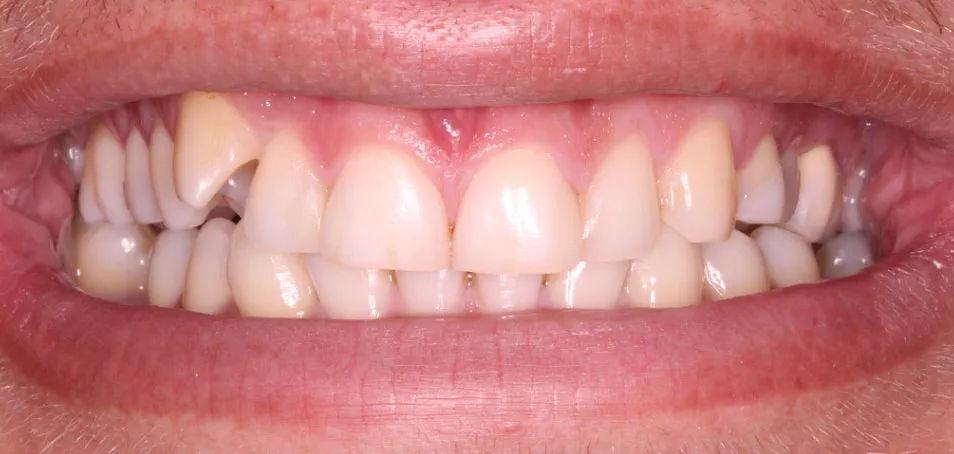
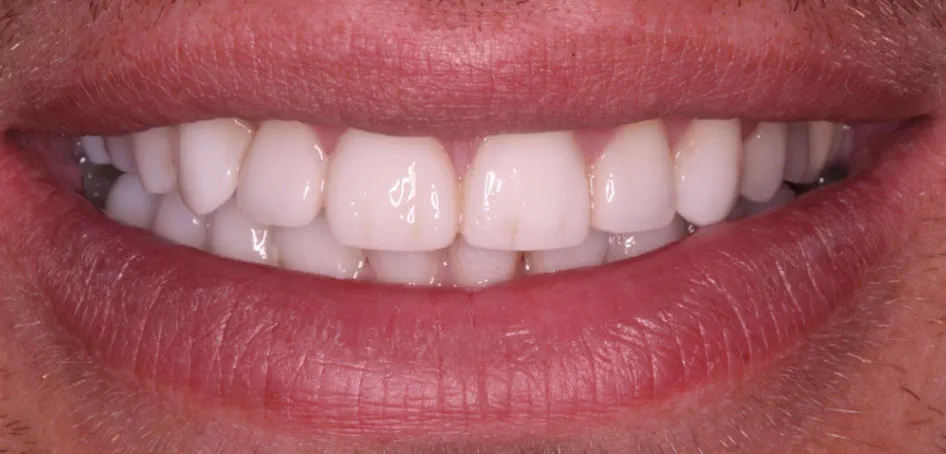
A combination of orthodontic treatment and composite bonding was used to change the shade and shape of this patient’s teeth.
What are the benefits of composite bonding?
Fast and effective
Composite bonding can usually be carried out in just one visit to the dentist. It’s a fast and effective way to fix minor cosmetic issues.
The composite is hardened using curing light as soon as it’s applied, resulting in a tooth that can comfortably bite down by the end of the appointment.
Non-invasive
Bonding is also a non-invasive procedure. With alternatives such as crowns and veneers, part of the tooth is permanently removed.
For composite bonding to be applied, the surface of the tooth only has to be roughened to help the resin to bond, meaning the structure of the tooth remains intact.
How much does composite bonding cost?
The cost of composite bonding in the UK can vary depending on the scale of the work you’re having done. Prices can range from £200 to £400 per tooth, your dentist can confirm the cost once a clinical assessment has been carried out.
Is composite bonding available on the NHS?
Composite bonding is not available on the NHS as a purely cosmetic treatment. However, it is available privately at most Bupa Dental Care practices. We believe in transparent pricing, and will be happy to discuss the cost of your treatment with you so you can make an informed decision.
How can composite bonding work with teeth whitening?
Composite bonding can also be a solution for staining in teeth and fillings. It can be used alongside teeth whitening treatments to help you achieve a brighter, whiter smile.
If you are planning to have composite bonding, the dentist will typically recommend that you have any teeth whitening treatments first. The composite resin will be selected to match your teeth colour, so it is advisable to get them to your preferred shade before treatment for bonding begins. Once the composite bond has been placed, it is not possible to whiten it further. Find out more about teeth whitening.
What is the procedure for composite bonding?
Your dentist will start by choosing a resin colour that matches your tooth best so that the resin attachment looks natural. Your tooth will then be prepared for treatment by slightly roughening the surface. It will then be coated with a liquid which helps the resin to adhere smoothly.
The resin will be applied and moulded into the required shape. It is hardened with a curing light before being shaped again and polished by your dentist until it matches the rest of the tooth.
Get in touch with your local Bupa Dental Care dentist to discuss composite bonding.
Can you have composite bonding with gum disease?
If you have gum disease, or had it previously, you may notice your gums have receded (shrunk). This can cause spaces to appear between some of your teeth. Composite bonding can be used to mask these spaces. However, if you still have gum disease, your dentist will need to treat and resolve it first.
What are the alternatives to composite bonding?
The usual alternative options to composite bonding are:
- Veneers - A veneer is a thin moulding custom-made from porcelain, which is bonded to the front surface of a tooth. They can also be used to cover gaps in teeth where orthodontic treatment may not be suitable.
- Crowns - A crown is a tooth-shaped ‘cap’ that’s placed over the entire visible portion of your tooth. A crown will feel and function just like any of your other teeth. And if you choose to have a porcelain crown, it will be virtually indistinguishable from your other teeth.
Both of these alternatives cause some damage to teeth. Veneers are a popular option which can last for many years but as they are made from porcelain, the tooth has to be cut down to fit them, which causes some permanent damage. Similarly, for a crown to be fitted, a dentist has to remove some of the healthy part of your tooth.
Bonding is a quick, less expensive and non-invasive procedure, and it can be easily repaired if damaged or broken. Talk to your dentist about your options. They will be able to advise you on whether composite bonding is the right treatment for you.
Alternatively, speak to your local Bupa Dental Care practice, they'll happily answer any questions you might have.
How do I care for my composite bond?
- Avoid tea, coffee, smoking and food which may stain for 48 hours after having the procedure done.
- Brush your teeth often and see the hygienist regularly to maintain good oral health. This will help your composite bond stay clean and unstained.
- Avoid biting nails or chewing items such as pen lids, which may chip the material. Bonds aren’t as strong as a normal tooth so it’s important to take precautions to avoid damage.

Other cosmetic dental treatments
Teeth whitening
Learn more about teeth whitening at-home and in practice. Find out if it’s right for you, including the costs and procedure.
Facial aesthetics
Looking to complement your new smile following composite bonding treatment? We offer consultations for facial aesthetics, also known as anti-wrinkle treatments.
Cosmetic dentistry
Cosmetic dentistry is a range of treatments designed to deliver your perfect smile – from teeth whitening and veneers, to whole smile makeovers.
Invisalign treatment
Invisalign treatment allows you to straighten your smile discreetly and comfortably with virtually-invisible, removable braces.
Veneers
A veneer is a thin, custom-made porcelain moulding that’s bonded to the front surface of a tooth. Veneers are a quick and effective solution to misaligned, stained, misshapen or chipped teeth.
Hygiene treatments
We offer a range of hygienist services including scale and polish treatments, AIR-FLOW therapy, and cosmetic, stain-removing brightening treatments.
^ We may record or monitor our calls.
Bupa Dental Care is a trading name of Oasis Dental Care Limited. Registered in England and Wales No: 00478127. Registered office: Bupa Dental Care, Vantage Office Park, Old Gloucester Road, Hambrook, Bristol, United Kingdom BS16 1GW.
Oasis Dental Care Limited has a number of trading names including Bupa Dental Care. Please see the list of our different trading names.


